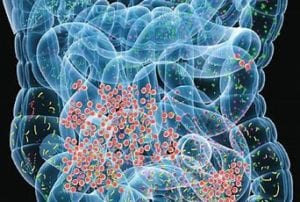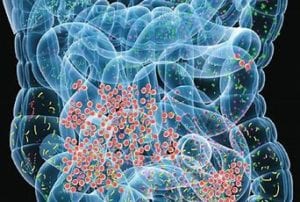Written by Taylor Woosley, Science Writer. Postbiotics play a vital role in maintaining gut health by regulating the balance of gut microbiota, supporting gut lining integrity, and modulating the immune system.
 Postbiotics represent an exciting facet of research in the realm of gut health and wellness. Postbiotics is a term derived from the Greek for ‘post’, meaning after, and ‘bios’, meaning life1. They are the health-promoting byproducts that emerge from the fermentation process of probiotics, that confers a health benefit on the host2. As probiotics feed on prebiotic sources, such as fiber, postbiotics are produced. Postbiotics consist of various substances like short-chain fatty acids, enzymes, peptides, vitamins, and other bioactive compounds3. Unlike probiotics, which are live microorganisms, postbiotics are non-viable and don’t require refrigeration or special handling.
Postbiotics represent an exciting facet of research in the realm of gut health and wellness. Postbiotics is a term derived from the Greek for ‘post’, meaning after, and ‘bios’, meaning life1. They are the health-promoting byproducts that emerge from the fermentation process of probiotics, that confers a health benefit on the host2. As probiotics feed on prebiotic sources, such as fiber, postbiotics are produced. Postbiotics consist of various substances like short-chain fatty acids, enzymes, peptides, vitamins, and other bioactive compounds3. Unlike probiotics, which are live microorganisms, postbiotics are non-viable and don’t require refrigeration or special handling.
In recent decades, researchers have clarified that the human microbiome is critical to both short- and long-term human health4. Metabolic diseases are serious threats to health and are partially related to imbalances of gut microbiota5. Postbiotics directly and indirectly benefit the host, with postbiotics directly interacting with the host cells. Indirect postbiotic benefits include alterations in the environment of the gastrointestinal tract, such as acidification6. Furthermore, they play a vital role in maintaining gut health by regulating the balance of gut microbiota, supporting gut lining integrity, and modulating the immune system7. By nourishing gut cells and fostering a healthy gut environment, postbiotics contribute significantly to overall digestive wellness.
The Health Benefits of Postbiotics
- Strengthening the immune system: Postbiotics play a pivotal role in regulating the immune system. They stimulate the production of beneficial immune cells and help maintain a balanced immune response, resulting in a robust immune system more equipped to combat infections and diseases2.
- Mitigating inflammation: While inflammation is a natural body response to protect against harmful stimuli, chronic inflammation can lead to various health issues. Postbiotics possess anti-inflammatory properties, helping to reduce inflammation and promote a healthier internal environment8.
- Promoting a healthy skin microbiome: The skin microbiome is a complex ecosystem of microorganisms that maintain skin health. Postbiotics can foster a healthy balance of bacteria on the skin, improving skin barrier function, reducing acne, and enhancing overall skin appearance9.
- Supporting mental health: Research suggests a strong connection between the gut and the brain, known as the gut-brain axis. Postbiotics have been shown to influence this axis, impacting mental health. They may help aid in mood regulation, anxiety reduction, and improved cognitive function10.
Discovering Sources of Postbiotics
If you’re interested in integrating more postbiotics into your diet, there are various sources to consider:
Foods rich in postbiotics: Certain foods naturally teem with postbiotics. Fermented foods like yogurt, sauerkraut, kimchi, and kefir contain live bacteria that produce postbiotics during fermentation. Other postbiotic-rich foods include sourdough bread, pickles, and miso. Including these foods in your diet can boost your postbiotic intake.
Postbiotic supplements: If your diet lacks postbiotic-rich foods, consider supplements. Opt for probiotic supplements that specifically mention the inclusion of postbiotics. These supplements provide a concentrated dose of postbiotics, ensuring you enjoy the benefits even without a diet rich in postbiotic foods.
Natural ways to boost postbiotic intake: Apart from food and supplements, other natural methods can enhance your postbiotic intake. A fiber-rich diet can promote the growth of probiotic bacteria in the gut, leading to increased postbiotic production. Additionally, reducing stress levels, getting enough sleep, and staying hydrated can support a healthy gut and boost postbiotic production.
*While generally well-tolerated, some may experience mild side effects when introducing or increasing postbiotic intake like gas, bloating, or an upset stomach, which usually subside as the body adjusts.
Posted June 11, 2024.
Taylor Woosley studied biology at Purdue University before becoming a 2016 graduate of Columbia College Chicago with a major in Writing. She currently resides in Glen Ellyn, IL.
References:
- Vinderola G, Sanders ME, Salminen S. The Concept of Postbiotics. Foods. Apr 8 2022;11(8)doi:10.3390/foods11081077
- Żółkiewicz J, Marzec A, Ruszczyński M, Feleszko W. Postbiotics-A Step Beyond Pre- and Probiotics. Nutrients. Jul 23 2020;12(8)doi:10.3390/nu12082189
- Scott E, De Paepe K, Van de Wiele T. Postbiotics and Their Health Modulatory Biomolecules. Biomolecules. Nov 4 2022;12(11)doi:10.3390/biom12111640
- Liang B, Xing D. The Current and Future Perspectives of Postbiotics. Probiotics Antimicrob Proteins. Dec 2023;15(6):1626-1643. doi:10.1007/s12602-023-10045-x
- Li HY, Zhou DD, Gan RY, et al. Effects and Mechanisms of Probiotics, Prebiotics, Synbiotics, and Postbiotics on Metabolic Diseases Targeting Gut Microbiota: A Narrative Review. Nutrients. Sep 15 2021;13(9)doi:10.3390/nu13093211
- Martyniak A, Zakrzewska Z, Schab M, et al. Prevention and Health Benefits of Prebiotics, Probiotics and Postbiotics in Acute Lymphoblastic Leukemia. Microorganisms. Jul 8 2023;11(7)doi:10.3390/microorganisms11071775
- Szydłowska A, Sionek B. Probiotics and Postbiotics as the Functional Food Components Affecting the Immune Response. Microorganisms. Dec 31 2022;11(1)doi:10.3390/microorganisms11010104
- Bourebaba Y, Marycz K, Mularczyk M, Bourebaba L. Postbiotics as potential new therapeutic agents for metabolic disorders management. Biomedicine & pharmacotherapy = Biomedecine & pharmacotherapie. Sep 2022;153:113138. doi:10.1016/j.biopha.2022.113138
- De Almeida CV, Antiga E, Lulli M. Oral and Topical Probiotics and Postbiotics in Skincare and Dermatological Therapy: A Concise Review. Microorganisms. May 27 2023;11(6)doi:10.3390/microorganisms11061420
- Chudzik A, Orzyłowska A, Rola R, Stanisz GJ. Probiotics, Prebiotics and Postbiotics on Mitigation of Depression Symptoms: Modulation of the Brain-Gut-Microbiome Axis. Biomolecules. Jul 7 2021;11(7)doi:10.3390/biom11071000







Comments (0)